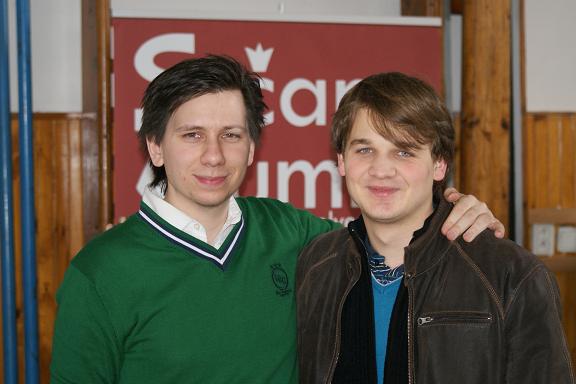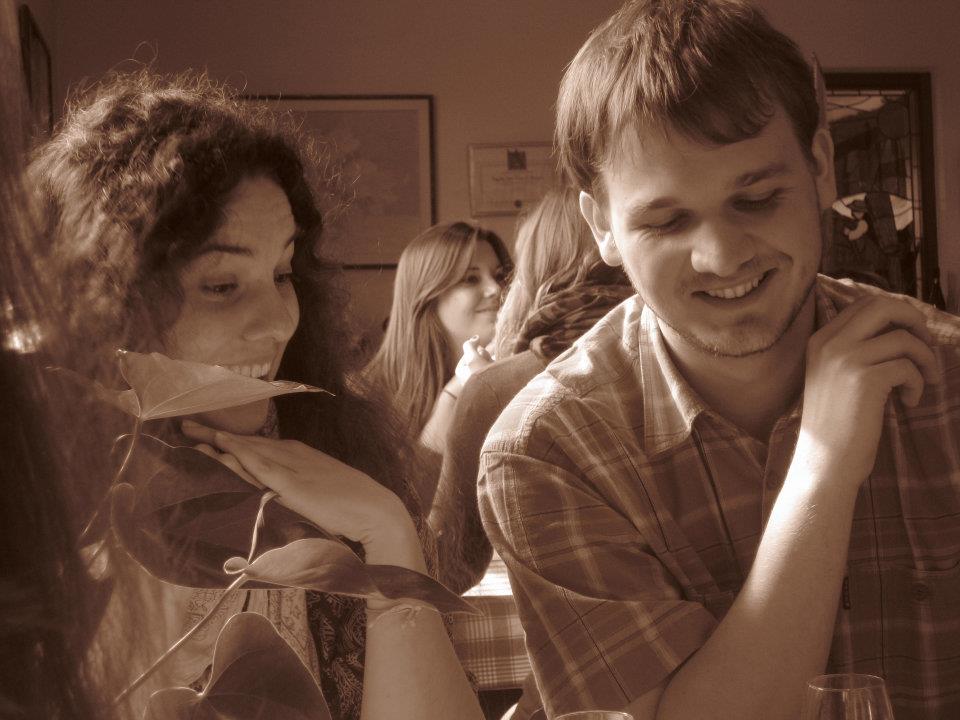Štefan Korbeľ – this young, yet talented and determined graduate of GBAS has recently become the new chairman of Sučany Alumni. In this interview you will find out how it all happened, where Štefan studied, what was his motivation to take up this post, what skills and knowledge he offers and what is the course SA is going to take with him in charge.

Hello, Števo. Before we get to your great plans with Sučany Alumni in the position of its new boss, I’d like to ask you more about the university you chose after graduating from GBAS.
After GBAS I went to the Aberystwyth University in Wales. At first I applied for International Politics and International History, but when it came to the enrollment I decided to take the opportunity to change this course to International Politics with French (for beginners).
It must have been challenging to study in French language. What was your knowledge of French after graduation from GBAS? Did you take the Maturita exam from French?
I had some French during my 2nd year at GBAS, but I actually started to learn it systematically and from the beginning in Aberystwyth. I didn’t study in French language there, I just learnt the language. I started to study in French just when I went to Institut d’Etudes Politiques de Strasbourg. After only 2 years of learning the language it was rather challenging for me, but I was lucky to be surrounded by very nice people who were willing to help me explore the dark linguistic corners of this language which otherwise sounds pleasantly. What is more, I was thinking of continuing my studies in France so I was logically supposed to improve my French.
I see. And why did you decide to rethink your choice of the course?
When I left GBAS after 5 years, the only foreign language I could actually speak was English, which was not exactly great since I wanted to study International Relations. My wish to explore other cultures and different worldviews through their languages also played a role.
Could you afford such a school or did you search for scholarships?
From this point of view, I decided to apply for two types of universities. One type were the American universities rich enough to support their students, the other type were the British universities which offered the students interest-free loans, in the latter case I knew I would have to find a part-time job in order to repay the loan. Especially the first year required a great sacrifice from my parents and siblings who supported my decision to study in Great Britain.
What about America? Did you not get to any of the universities you applied for or did you choose Britain regardless of the result from America?
I didn’t get to any of the 5 prestigious universities I applied for. The only consolation for me was that I ended up on the waiting list for the Harvard University. But after all it doesn’t really matter, because it’s all about actually getting there.
As you have already mentioned, you also studied in Strasbourg. What were you doing there, how did you actually get there?
The time I spent in Strasbourg (a year abroad) was obligatory for me because the foreign language was a part of my course. I got there with the ERASMUS exchange programme. I took the opportunity to get a one year diplom which enabled me to apply for continuing my studies right there. But then I decided to graduate in Aberystwyth.
How would you evaluate the working possibilities for students? Are there many of them? Or few?
Aberystwyth is actually a very small town. Students make about one third of the population so there is quite high demand for jobs and not that much opportunities. But everyone who tries hard to find a job will eventually succeed. All the Slovaks who needed this kind of source of money in Aberystwyth whom I know have actually found jobs during their first year there.

What was your motivation to stand for the post of the chairman of SA? What do you expect from it? How did you learn about the possibility to stand for the election?
I had two reasons to stand for the election. Firstly, the project of a graduates’ association is unique in Slovakia and it’s got great future perspective. I believe I can and will contribute to the development of our association. Secondly, I just really love GBAS. I learnt about the opportunity at the general assembly of SA which took place in September 2011. Tomáš, the founder and the former chairman of SA, announced his decision to resign from his post. My decision to stand for the election was primarily based on my wish to somehow contribute to Sučany Alumni and GBAS itself. Of course, I am also aware that this function will be beneficial for my personal development too. Concerning my personal expectations, I believe I will gather experience in management of a civic association, thus management in general, improve my communication skills, learn more about the Slovak society and get to know lots of great people. I’ll also be more in touch with the GBAS people whom I know and last but not least, I’ll feel good about doing good job helping other people.
What’s your main goal concerning SA? What are you planning to change?
My main goal is to try to keep SA’s existence meaningful and make it work fine in the future. SA’s job is to associate GBAS people and make it easier for them to keep in touch among one another. Another aim is to support the current students as well as the graduates in their personal development and career opportunities. Our first goal is to increase the number of members who would be willing to support SA financially and become active in our matters. The second important think is the diversification of SA’s income which means searching for sponsors, partners, grants etc. There are two aspects to this all – one one hand, there’s coordination and communication. For example, currently we’re working on a project of establishing contact persons for each year’s graduates as well as the regional ones who will make it easier for both current and former GBAS people to get in touch with SA. I’m also dealing with your editorial office about creating a special section for SA/graduates in your magazine. I also believe we will be able to cooperate with the Students’ Council as a body which represents the students and is aware of their needs. For finding financial sources the active communication with the outside is inevitable. It’s connected with the second aspect – the work of SA itself. Most of the projects which have already proved will continue, for example the presentations given by our graduates, the University Clinic, the Milan Hodža Scholarship, Student and Staff Awards and Sučany Mastermind. We plan not only to improve these activities, but also to start new projects such as “Careers Library”, Travel Grant and according to the degree of willingnes of our potential partners, maybe also even some discounts for products and services for our members. We also want to organise events for the graduates.
Is there anything you’d like to say to the people who haven’t become memebers of SA yet? Why should they become members and what can SA offer them?
SA offers several material benefits such as the school magazine KARIS for free. I must admit there have been cases in my life concerning my studies and career in which I would have decided differently if I had known things. From my point of view, the non-material services provided by SA are actually of much greater importance than the material ones. Lots of young people underestimate the value of the first-hand information about the life after GBAS provided by the network of contacts, the presentations given by the graduates and consultations about students’ choice of a university and thus also their career. What’s SA trying to do is to stop that from happening. The students who will actively participate in SA will improve their organisation and communication skills and that’s something that both universities and employers will appreciate. We will also organise interesting events and meetings connected with various activities for the graduates – it’ll be a chance to have fun, meet friends but also get to know new GBAS people… Our contact network will also enable them to find information that could help them with further personal improvement and career life. Many of us will agree that GBAS was one great experience that has changed our lives and actually enabled us to succeed in what we have chosen later and we’re grateful for that. The idea to selflessly help the school that gave me so much was the ground for launching SA. We try to reward the active indivuduals, but the social aspect also plays an important role in supporting our students. The Milan Hodža Scholarship project enables us to help those who otherwise couldn’t afford to study at GBAS. We also hope this year will be the first in which we’ll be able to offer loans to study in UK for the fresh graduates. By becoming a member of SA you support our activities and motivate us to go on with our work. The activities of Tomáš, the whole previous board of SA and all the other supporters of SA were recognized by many, the last time it was the jury award MOST 2011 (a reward from the Youth Council of Slovakia). But after all, the greatest reward for us will be if you support us by actually joining us.
What’s your creed for life and what motivates you? Share it with us, please – maybe you’ll inspire someone.
Love and responsibility are the greatest powers.
Štefan was interviewed by Kristián Filip. You can find more about Štefan on his profile.
The interview was published in the September issue (Issue 13) of the Karis school magazine. The graduates, former students and former staff who are the members of SA will obtain the e-version of KARIS between 8th and 14th October or after registration and payment for the membership. We would like to thank all our donors and members for their support!
by Štefan Korbeľ at 12:11
